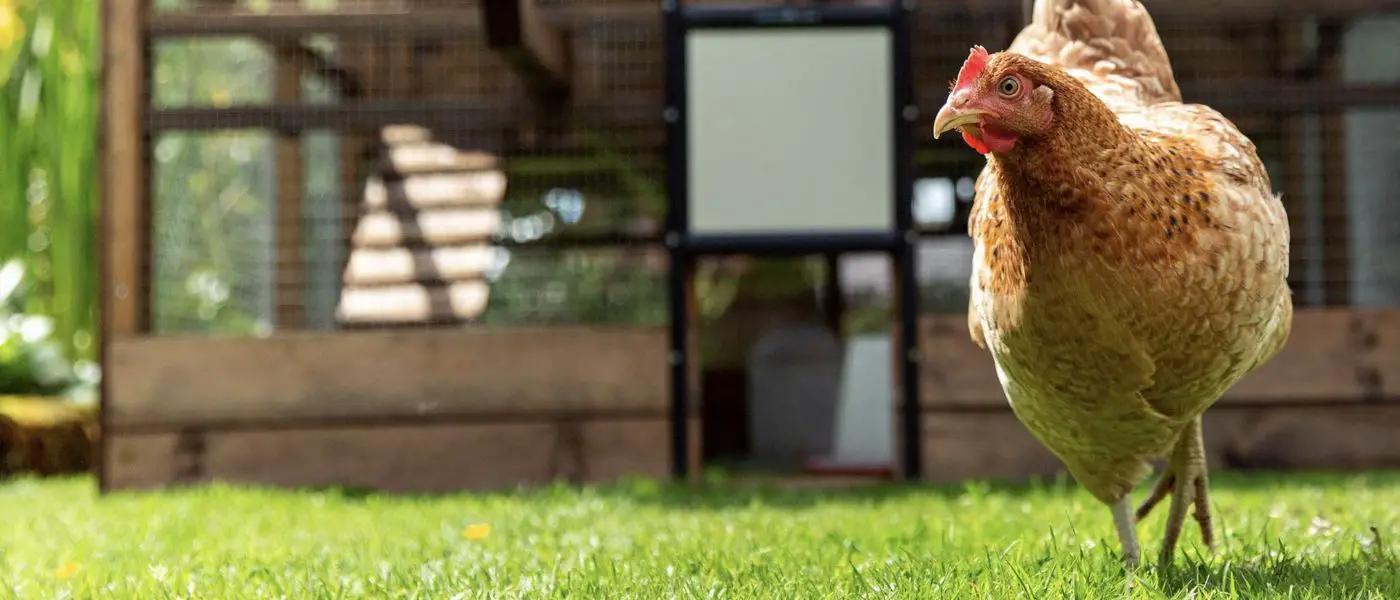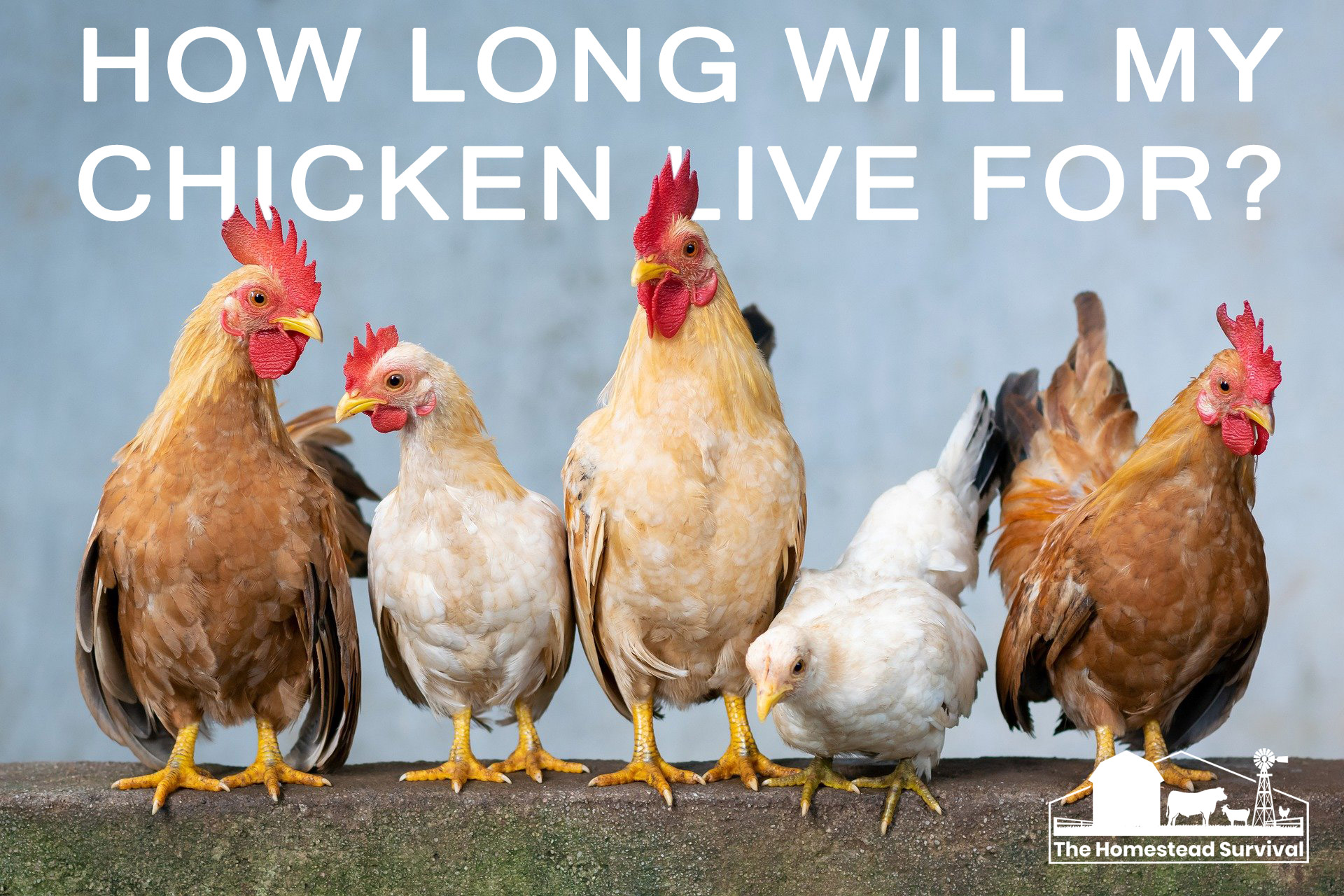In this post, we will be talking about the life expectancy of backyard chickens. What is the average life span of a backyard chicken?
Chicken lifespans vary widely, with most hens generally living between 3 and 7 years. However, with ideal care, they may live even longer.
If a chicken is kept safe from predators (including dogs) and doesn’t have genetic issues, they can certainly live 10 to 12 years old.
The oldest chicken ever to have lived was called Matilda, and she was sixteen years old when she finally died. Her life circumstances were not ‘average chicken’. She belonged to a pair of stage magicians who took great care of her. Also, she never laid any eggs! She had quite a luxurious life with minimal stress- she apparently enjoyed being a ‘stage chicken’, even appearing on the Jay Leno show! You may ask, how long will my backyard hen live?
Whether you keep chickens as pets or for a fresh egg each morning, it’s important to know the life expectancy of your chickens and how long you can expect to be in the company of all your flock members.
Aside from exceptional birds like Matilda, how long can we expect our hens to live?
The lifespan of a chicken depends on many things: breed, environment, genetics and keeper are just a few things to consider.
The history of chicken life expectancy
The ancestors of our hens were wild birds, and as such, life expectancy was short. If they could survive predators, hunger, and other life-threatening events, they could actually live 2-4 years at most.
In the mid to late 1800s, the man started collecting chickens and ‘tinkering’ to meet human expectations. We irrevocably altered the chicken’s life.
We suppressed many of the wild behaviors, productivity increased, and chickens became a food source.
So nowadays, the lifespan of a backyard chicken can be anything from 3-10+ years. Their lifespan can vary depending on a lot of reasons, so keep reading to learn why.
Factors that Affect Chicken Life Expectancy
1. Commercial Hybrids vs Heritage
One of the first things to consider when trying to determine the life expectancy of your chicken is the breed. Genetics play a huge role in how long a chicken will live.
Commercially raised chickens, for example, were meant to be extremely productive in a short period of time, and when they’ve fulfilled their purpose, their lives end. Genetics have been tampered with in hybrids and their lifespan is usually much shorter than backyard flocks of heritage breeds.
2. Breed and Environment
Some breeds are hardier and savvier than others. This is relevant when it comes to free-range predator-aware birds or breeds that are meant to live in certain climates.
10 Most Popular Breeds And How Long They Live
| Breed | Expected Lifespan | Popularity |
|---|---|---|
| Rhode Island Red | 5-8 Years | #1 |
| Silkie | 7-9 Years | #2 |
| Plymouth Rock | 8-10 Years | #3 |
| Orpington | 8-10 Years | #4 |
| Leghorn | 4-6 Years | #5 |
| Wyandotte | 6-12 Years | #6 |
| ISA Brown | 2-3 Years | #7 |
| Australorp | 6-10 Years | #8 |
| Cochin | 8-10 Years | #9 |
| Easter Egger | 8-10 Years | #10 |
Shortest Living Breeds
The three breeds with the shortest lifespan are:
- ISA Brown
- White Broilers
- Cornish Rock
If you keep a tight-feathered breed in sub-zero temperatures, for example, it probably won’t last long. If you keep a bantam chicken in a free-range environment, they are easy targets for all kinds of predators.
3. Diseases
Diseases and parasites of poultry have been studied extensively.
Many advances in caring and treating several diseases, understanding the methods of infection, and the introduction of good bio-security have improved the overall health of poultry in recent years.
However even with these advances it still remains true that hens living in less cramped quarters with good nutrition, fresh air and plenty of space, will live longer than chickens crammed into large production houses.
Unfortunately, there’s always a new disease to be on the lookout for. Some diseases are deadly to your flock, and others can be treated.
If you take the time to learn about different chicken illnesses, you can often prevent them from ending your chickens’ lives too soon.
Vaccinating chickens for known diseases, like Mareks Disease, can help ensure your flock never contracts the disease.
In addition, keeping your chickens out of the public eye, i.e. fairs and shows can help prevent the spread of disease to your homebound flock on the return of your showgirls.
Diseases are many, and they can spread quickly, so it’s imperative to understand the different illnesses that your chickens may contract, and end their lives sooner than anticipated.
4. Quality of Care
If you’re diligent about meeting your flock’s basic needs, your chickens can live a long and healthy life. All-in-all, chickens are pretty easy to care for, but you must be diligent and make sure they always have the following:
- Adequate shelter based on your regional climate
- Feeding based on their life stages (starter, layer, grower)
- Clean, unfrozen, water 24/7
- A clean, well-bedded, coop to prevent the spread of disease and parasites
- Grit to ensure proper digestion
If your chickens are not kept out of the elements in sub-zero temperatures, for example, one difficult winter can take years off an otherwise healthy chicken’s life.
5. Feed
Chicken rations of today are far superior to many of their predecessors. Selecting the correct feed and diet is extremely important when considering the lifespan of a chicken. Food is essential for the body and it ensures that your chicken will have all the nutrients and supplements necessary to live a happy life.
If your hen is laying eggs, make sure that she has enough calcium in her diet for strong shelled eggs as well. This is another area where tremendous progress has been made.
Chickens used to subsist on whatever they could find in the way of grains and morsels, plus whatever the farmer might toss their way.
Whilst we may disagree with the use of GMOs’ in animal feeds as ‘unnatural’, when comparing to the ration of yesteryear it is a truly wholesome thing.
6. Housing
Chicken housing has come a long way since Grandma’s day. Back then, the chickens would likely share the barn with the larger livestock.
They made their living from whatever was available to them. They could freeze to death, be trampled by bigger animals, killed by predators, and a host of other indignities could be heaped upon them.
Nowadays, they have purpose-built coops in the backyard designed to keep them cool in summer and warm in the winter.
7. Genetics
We have mentioned above that the manipulation of breeds to maximize egg output can hurt the species’ long-term survival.
Bird breeding can be tricky with breeds that have a small genetic pool. Oftentimes birds are interbred excessively to the detriment of the species as a whole.
This clearly impacts lifespan.
Diligent breeders who bring in new stock from unrelated lines try to increase the gene pool and create some diversity within the breed.
But it is a long and costly process and fraught with failures and disappointments.
Why Do Some Chickens Live Longer Than Others?
The breed of your chicken plays a major role in determining how long they will live for.
Feed and diet are also important elements to consider when raising chickens. A poor diet with poor quality feed can cause certain nutrient deficiencies and early onset of diseases.
Coop setup can also play an extremely significant role in the lifespan of your chicken. Proper ventilation is essential to the air quality inside the coop – this is very important if you keep your chickens inside the coop for extended periods of time every day.
While certain things (like vet care and good diet) will increase the lifespan of a chicken, others can both shorten and lengthen their lifespan.

Benefits of Older Hens
Older hens still are great bug catchers, they still make tons of nice manure for the garden – and they often make far better broodies and mothers than younger hens.
Older hens tend to be better at watching for predators and teaching younger flock members how to protect themselves and also showing the young ones what is good to eat and what’s not.
As a backyard hen ages, she can tend toward obesity, especially if fed an improper diet or too many treats.
Chickens evolved with the ability to develop an abdominal fat pad to use as reserve energy during times when forage is scarce. Most young chickens, especially active free-range birds, have a relatively thin fat pad. In general, an older chicken has a thicker fat pad than a younger chicken.
Old hens, especially inactive hens fed too much grain, can accumulate enormous quantities of fat, to the point that the abdominal cavity is virtually filled with fat.
Heavy breed hens that are characterized as being cold hardy conserve fat more readily than lighter Mediterranean breeds, and therefore more easily become obese. Besides interfering with laying, obesity can lead to significant health issues.
And that’s it for today. Any suggestions / comments? Feel free to ask.


